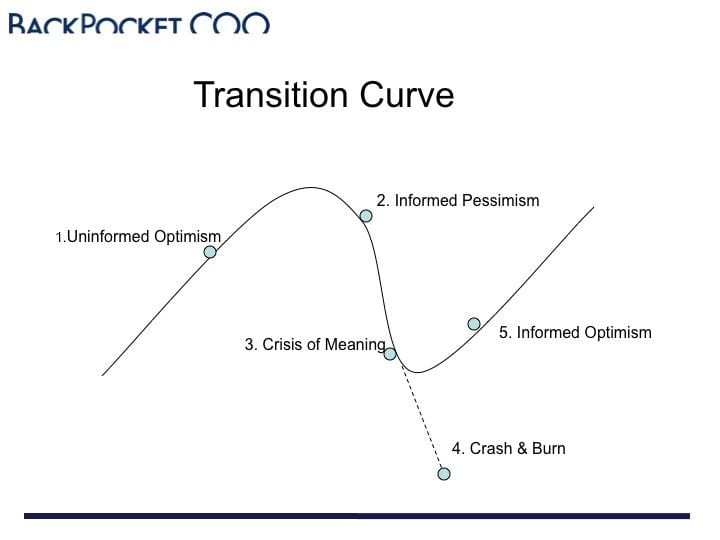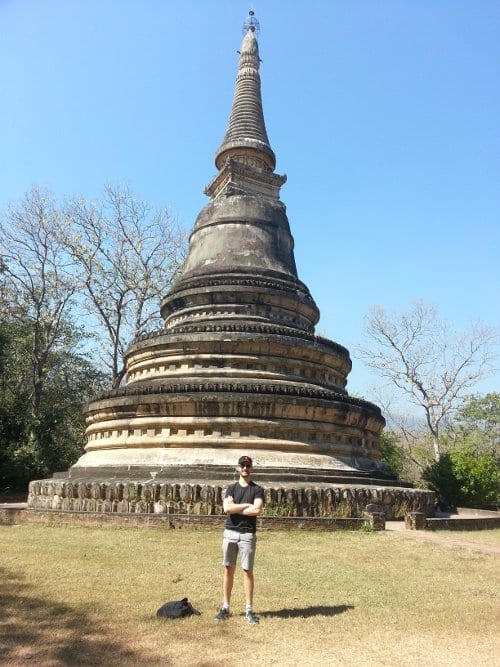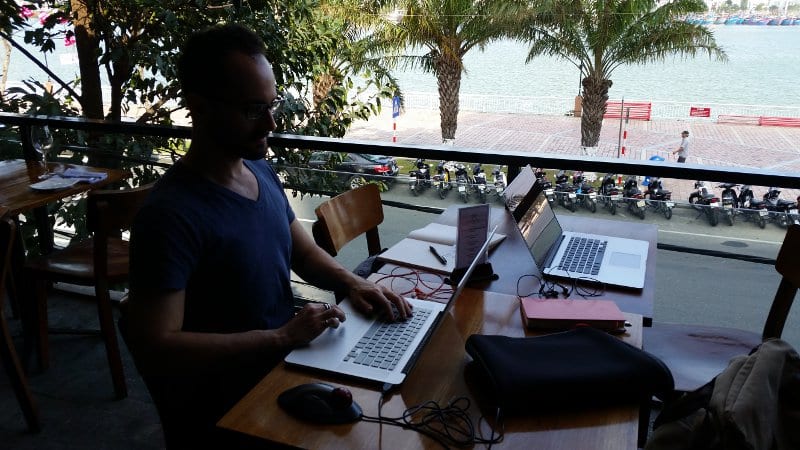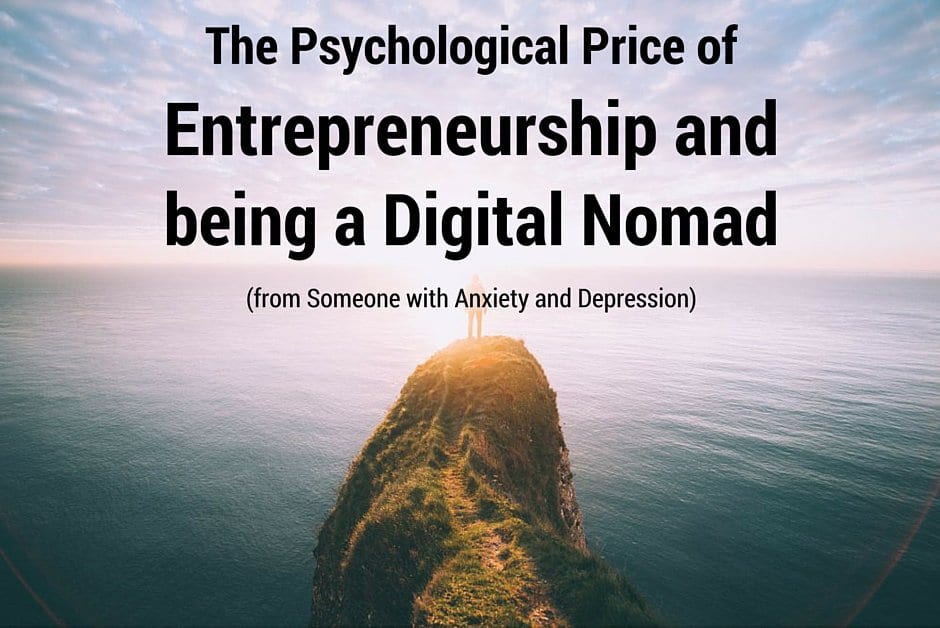Entrepreneurship and becoming a digital nomad are probably the most difficult things I’ve ever done in my life.
I’ve had anxiety and depression my whole life, and go through ups and downs, but entrepreneurship acts as a multiplier.
The highs are super high, but the lows can be unbearable and way too much at times.
And it’s not just me. Every day there are more and more stories of entrepreneurs quitting or coming out saying that they’re depressed and suicidal… That they’re lonely and wonder if they’ll ever be able to enjoy playing with their kids in a park after sacrificing so much and not having time to raise a family. Or, that there’s just a huge psychological price to pay.
To be blunt with my credentials: I have a Master’s degree in Biomedical and Mechanical Engineering, I just recently became a patented inventor, and because of this blog, I’m a #1 bestselling author.
The starting salary in my field if I took a 9-5 job could be $70,000-$80,000+ a year.
…So why do I put up with it? Is it really worth it? Is society glorifying being an entrepreneur and the digital nomad lifestyle? Is getting a 9-5 “better,” or would that be a “way out” and would I be a “wage slave” that’s going into the system?
In this article I want to give some answers to these questions and to also paint a realistic picture of entrepreneurship. Granted, I’m not a seasoned veteran with tons of companies, but after being around many others and running my own companies for several years, I feel that I can talk about some of that journey.
If you’ve never been involved in a start-up, you’ll get a behind the scenes look at the not-so-glamorous parts of entrepreneurship.
Finally if you’re thinking of becoming a digital nomad, and accept some of the realities I’ll present here, I’ll give you some tips as to how you can try out the lifestyle without committing all of your life savings or time to it.
But, there’s one thing we need to get straight right off the bat:
Society Glorifies the Lifestyle, But Is it All True?
Today, it seems that society as a whole tends to glorify and salute entrepreneurs: The Mark Zuckerburgs, Mark Cubans, all-night coding sessions, coffee-infused work times, only sleeping 4 hours at a time, and more.
There doesn’t seem to be much of a tip off to the 9-5ers, and we’re made to think that entrepreneurs are infallible, unbreakable, and can’t be beat.
You’re Being Lied To: The Harsh Realities of Being an Entrepreneur and Digital Nomad
When it comes specifically to being a digital nomad, I actually get PISSED at people who promise you can “Escape the 9-5 forever and live like me in forest temples!”. You see their Instagram pictures near statues and waterfalls making you feel like shit if you aren’t at that place either as a nomad or 9-5er, playing with your emotions.
Now I’m not talking about genuinely posting pictures to update people, or those who do it to track their own lives. I’m talking about people who purposely do it as a marketing gimmick. It’s very similar to the marketing tactics by major men’s dating companies and the pick-up community showing guys making out with girls in clubs.
What’s the other typical picture you always see? The person on a beach with a coconut and a laptop. (Note: Fuck that. If you’re working on the beach you won’t get shit done, you’ll get sand in your coveted Mac, and you’ll be frustrated because you wasted a day neither working or playing on the beach!)

“Oh my god I’m being SO productive with my bikini and Mimosa while checking my phone on the beach.” Uh huh, sure honey.
Image Source: Teleport
A great deal of people also pull one over on aspiring nomads, pushing the sexy “Make an e-book and make thousands right off the bat!” story.
I know I was lured in by that as well.
That doesn’t work. What DOES work is building up the necessary skills, freelancing them or creating a service-based business so you can support yourself, and building the sexy stuff up on the side.
Side note to (aspiring) digital nomads: Sean Ogle is known to preach this 3-step process. If I had known it before and accepted it, it would have saved me tons of time, stress, money, and aggravation. I HIGHLY recommend if you’re looking into starting this lifestyle that you check out his program Location Rebel. It’s expensive, but it’s worth it. I do not receive any affiliate commissions if you sign up, I just think it’s a good program and he knows what he’s talking about.
Now here are some things that AREN’T glorified about entrepreneurship and the digital nomad lifestyle by the public, people trying to get you to buy their e-book, and otherwise:
- Selling the nomad lifestyle but only where you can live well in Thailand or some other similar third-world country, making less than $1,000 a month, grinding for hours writing articles on vitamin water or hair dryers for SEO purposes.
- Never properly learning to grow and scale a business, so again, you’re stuck in Thailand and can never support yourself in a Western country. Or, having to go back to get a job anyway.
- 90% of people quitting after 6-12 months due to the inconsistency involved with the lifestyle or it being too difficult.
- Having panic attacks and incessant burn out from overworking.
- Constant worrying that what you’re doing will never work, is a waste of time, and never being able to take your mind of your business… even when you’re AWAY from the business and trying to relax.
- Burning your eyes out for HOURS in front of a computer screen.
- Going into massive debt.
- Missing family events back home when overseas.
- Never being able to create meaningful or long-lasting relationships, those that are romantically-based on just friendships in general, because of overworking or moving around so much. In fact, a great deal of nomads and entrepreneurs are commitment-phobic.
- Having to move back in with your parents or on to your friend’s couch because you can’t afford your own place.
- Crushing and massive isolation: Feeling like nobody understands you in your friends and family circle, and you can’t relate to anyone around you, especially in a foreign country.
Some of these things have happened to me and I know others have been through similar circumstances.
It’s definitely far from it all being roses.
The Psychological Price of Entrepreneurship: Manic-Depression and Mindset Issues
It’s no wonder then that many entrepreneurs are also characterized as being manic-depressive.
In fact, Tim Ferriss published a guest post on his site that actually shows a predictable “entrepreneurial roller coaster,” with highs and lows, and what an entrepreneur should focus on at each stage given their mood.

The entrepreneurial roller coaster, as posted on the Tim Ferriss blog and suggested by Cameron Herold: Entrepreneurs go through predictable cycles and each phase has certain activities (ranging from talking to the public, hiring, to investing) which can be good at the time, or outright terrible. Read more about this by clicking on the image.
And yes, it really works. I’ve used it.
Entrepreneurship and becoming a digital nomad can also create HUGE mindset problems and issues with limiting beliefs in you:
The problem with always needing to see and do more
At the beginning of becoming a digital nomad, there’s a high that comes from visiting new places and meeting new people.
There’s always more to explore and more temples to see.
It’s amazing.
But after a while, and when you need to focus, it becomes distracting and annoying. You feel like you ALWAYS need to be running around, like you’re always missing out on something (FOMO).
It can go from making you grateful to pissing you off in a flash.
The problem with not achieving enough and needing to always be more productive
Nootropics, or smart drugs, are epidemic in the entrepreneurship community.
These are cognitive enhancers, that help focus, mood, and productivity. They range from easy stuff like caffeine and coffee, to pills usually prescribed for narcolepsy, obtained overseas, and used for their side effect of being able to stay awake and alert for 16-20 hours (Modafinil).
You constantly search for new life hacks to prune your schedule of ANY lulls, you aren’t allowed to have off days, you feel worthless even though you just signed a new client (because you lacked efficiency in upselling your services) and you could be earning more money.
It all leads also to…
The problem with feeling like you aren’t good enough
When everything is about how much you can output and when you see people around you just being successful, sometimes it can just be a crushing weight that won’t let up.
Other people have successful companies, so why don’t you? Why are you still struggling? Why are you scrounging to make money and people have it figured out but you don’t?
It’s perfectionism on steroids.
Of course, many of these beliefs can be worked on through proper framing and perspective, but they’re always there, working in the background.
So, is a 9-5 Grind “Better”? Or Would That be Selling Out and Becoming a “Cog in the System”?
One of the biggest “advantages” touted with becoming an entrepreneur or a digital nomad is that a 9-5 job makes you a cog in the system of school, work, marriage, 2 week vacation, retirement at 65, then death.
It makes it seem like the 9-5 is a horrible and terrible life that’s just a grind.
Newsflash: EVERYTHING involves some sort of grind, the grind just changes in form and style. It’s up to you to decide what type of pain you can put up with.
In fact, one well known nomad in the circuit, Johnny FD, talks about how when he started working on his dropshipping business, that he came everyday to a coworking space and worked 8AM-4PM. In other words, he worked just as he would at a “normal job.”
Paraphrasing him:
“These are the same hours a 9-5 job would expect of you. I didn’t grind myself into the ground working 16 hours a day, but I didn’t fuck around. I took my work seriously so I could be successful.”
If you don’t think that being an entrepreneur is a grind, think again. It’s not all billion dollar companies off the bat.
There are skills you need to learn, you’ll apprentice for shitty wages at the start, you’ll have way too many questions and be putting pieces of the puzzle together, and you have to constantly put your hours in, day-in-and-day-out.
There’s NOTHING wrong with a 9-5 if it’s something you love doing.
The problem is when you take something because you have to pay the bills, or you think it’s the only path, and never think to ask otherwise. It’s when you’re making the choice without thinking, or work at McDonald’s your entire life with no plan to move on.
For example: When I was going through all of my schooling for engineering (~ 8 years including co-op terms), I thought my mission was to design artificial hearts. There was something about the heart that struck me and I would be saving lives and helping people. I chose to do ALL my biomed projects on hearts and blood flow just because of that.
But then suddenly, I knew I wanted more flexibility that a normal job probably wouldn’t afford. I wanted to be able to live wherever I wanted, whenever. I needed to be able to make my own schedule so I could go to the gym or sleep in if I stayed up late doing work. I HATED answering to bosses that I thought were incompetent or didn’t know what they were doing. I wanted to be able to work HARD for a few months, then take 1-2 weeks off, and cycle that. I don’t believe in hours in = productivity out (though again, you do need to put in consistent hours no matter what).
Then through the men’s dating advice/pick-up arena and from friends around me, I got led into entrepreneurship, online business, and the rest is history.
My thought now is that I may go back to engineering and product design later on using the marketing background I’m gaining at the moment.
But that’s not my mission now.
My point is that everything requires a grind. Magically selecting entrepreneurship doesn’t negate that. In fact, the grind for entrepreneurship could be argued as being even WORSE, because when you’re doing your own thing, only YOU set the limit and you can always improve.
The typical “grind” of the 9-5 ends when you retire or at the end of the workday. One might just argue it’s a slow feeling of the same thing day-in-and-day-out that wears on you.
You should choose whatever makes you HAPPIEST and go along that path. That comes to how you work within your job, the job itself, and everything else in life.
But It’s Not All Bad…
I’ve painted some bleak pictures of entrepreneurship and the digital nomad lifestyle sprinkled in with some positive points so far.

OK… One token temple shot. This was one of my favorite places that I visited when living in Chiang Mai.
I want to emphasize that by no means do I think that the lifestyle is bad at all.
In fact, I thank God I found it because despite the stressful times, the pros FAR outweigh the cons for me:
- I’ve gotten to visit over 10 countries in just over a year, and live longer-term in two of them (Thailand and Vietnam).
- There are so many amazing experiences I’ve had and people I’ve met that I would have NEVER been able to get if I stayed in my hometown working, or if I’d never learned about what’s out there.
- I’ve been able to learn a TON of cross-disciplinary and applicable skills so fast that I never even knew existed (copywriting, sales, writing and explanation, A/B testing, the scientific method applied to non-scientific experiments, sales funnels, the list goes on…)
- I’ve published and made money on work that’s 100% my own that never existed before, and get e-mails from people saying that I’ve helped them and changed their lives. That’s all still insane to me and makes me feel amazing.
When I have down times I think about all this, and how my pre-nomad self would look at what I’m doing right now and have done. It helps show me how the hard times that eventually pass are worth the struggle and effort.
That, or talking to someone to get them to pull me out of my own head. 🙂
How to Know When to Quit (If You’re a Digital Nomad or Entrepreneur Right Now)
An important note that I think needs to be mentioned is on quitting.
With all the motivational videos out there about struggling, things not working, but just staying positive and know that things will work out, there may come a time when you need to throw in the towel… at least temporarily.
Most people know if the lifestyle is for them within the first six months.
Others might have to postpone the “dream” in the short term, take a regular job, and hustle on the side.
The important thing is to really spend time with yourself and ask “What do I want? What makes me happy? What am I willing to put up with? Where do I really want to be in life?”
And if you decide to quit, don’t be down on yourself.
Don’t feel like a failure.
You’ve tried to do something that most people quite frankly don’t have the balls to do. You’re learned a ton.
And again if this is really a passion, it doesn’t mean you can’t do it again in the background, or that you haven’t learned for the future as to how to proceed more intelligently.
“There is no failure, only feedback.”
If you’re an entrepreneur and nomad who’s reading this and you feel lost, burnt out, and like you can’t go on… know that TONS of other people are right there along with you and there’s no shame in talking to someone about it.
We’re not unbreakable, but we sure as hell are strong.
Bonus: 5 Steps To Try Out Becoming An Entrepreneur And Digital Nomad
If after reading all this you think you might want to try out the lifestyle I have good news for you:
There’s no need to go balls to the wall right off the bat.
You don’t have to quit your job and try to get an online business going, going into massive debt.
You can dip your toe in the water and see if it’s for you.
Here are 5 steps I would advise someone to take if they’d like to try out the lifestyle:
- First, try working outside the office away from a boss to see if you can work without direct pressure being applied to you. Negotiate a remote work agreement. Tim Ferriss has strategies and scripts you can use in Four Hour Work Week and you can also check out this article here. Make sure you learn about how to beat procrastination when you work from home.
- If you can’t negotiate a remote work agreement, consider trying to find a single company that allows remote work (note: you might have to take a pay cut), or, consider asking the company you’re working for your vacation. During that time, try freelancing.
- The fastest way to learn how to freelance is by using Location Rebel which has step-by-step blueprints as I mentioned before. You can learn how to get clients, the skills you need, etc. yourself, but it’ll take a long time and this shortcuts the process.
- If you do successfully negotiate a remote work agreement or find another company to work for, try going to a new city for 1-3 months. Chiang Mai, Thailand, is ground-zero for digital nomads with TONS of people to meet and an active community. Thailand also has great infrastructure and the city of Chiang Mai has lots of stuff to see. It’s known as “the city of temples.” You can save THOUSANDS of dollars on airfare by learning about travelhacking.
- After this “trial period” you’ll have a better sense if you can make it in the lifestyle, you get too easily distracted, or if you prefer what’s back at home.

I found that having a home office set up where I’d work until lunch, then meeting a friend for work in the afternoon was the best combination. In Da Nang, Vietnam, I found a waterfront restaurant where the street wasn’t too busy, and you’d have an amazing view of the ocean while cranking through work. Perfect combination and no sand… usually (once, heavy wind blew sand all the way from the beach).
Conclusion: Is It Worth It?
I’ll give the same answer I gave in answering the direct question: Does becoming a digital nomad help fight anxiety and depression?:
It depends.
It depends on what you value, what your ideal life is, and your personality.
If you can’t motivate yourself, hold yourself accountable, aren’t a self-starter, need things spelled out for you and your hand held, then entrepreneurship and being a digital nomad DEFINITELY aren’t for you.
If you can’t handle periods of the less-glorified things I talked about at the beginning of the article (debt, stress, burnout, isolation), then it’s also definitely a bad decision.
If you think these skills match your lifestyle and you’re looking at ways to have a more flexible schedule, control your hours, and so on, then it might be something to think about.
Many nomads live the moving lifestyle for a certain amount of years and then settle down, or choose a “home base” city: They’ll travel here and there, but always come back.
For example: Tim Ferriss in San Francisco, and Mark Manson most recently in New York.
Some nomads live in places longer than others as well. I like to stay in cities for 3-6 months, as moving around too much fucks with my anxiety and doesn’t let me be productive and build things. Other people move every 2 weeks. It’s up to you, which is the great thing about the lifestyle and why it’s also known as “lifestyle design” — you pick what you want to do and how.
No matter if you choose to become a nomad or an entrepreneur, just know that the best ones and those who are successful work their asses off.
There’s no other way.
There’s a price to everything in life no matter what path you choose.
Hanging out with a certain group of people, selecting a career, living in a certain place…
Nothing comes for free and there’s always going to be a trade off. There are always going to be pros and cons about any choice you make.
It’s up to you to experiment, find out what works best, and see what’s right for you.
Just don’t believe all the hype. Know what you could be getting yourself into and if there’s any doubt, know that the best teacher is direct experience.
Try it yourself, but know what you might be getting into.


Comments 11
Excellent post, I agree that no matter where you are and what you do, you have to put in the hours, so in the end…it is all a grind.
I wish the term ‘digital nomad’ would a horrible death and be replaced with the much more accurate term of ‘lifestyle design’ since I have found that no two people who would be considered digital nomads work and live the exact same way. Also, I too have struggled with anxiety and depression, so I can relate in terms of traveling too much affecting productivity and developing burnout.
Author
Thanks Aaron!
Yeah that’s what I was trying to get across as well. Lifestyle design is AMAZING and that’s what we should ALL be aiming for… 9-5, nomad, garbage man, teacher, whatever.
But moving every 2 weeks? Fuck that, in my personal opinion. Getting to wake up early, not having to commute, gym mid-day, and working on things I think are important? Gimme, gimme.
Now with all the mobile/online tools and remote work being popularized, it’s an amazing time to be alive.
Seriously.
Hi Noam! Thank you for the read which I could easily rely to. I’m at the threshold point where I will finally fly for my first trip as a digital nomad in August 2016. But I’m just starting to feel the dream was worth it. Sometimes it never happens. I realize since a few months that dreams can be often exhausting when we reach the point they aren’t driving us higher and are starting to feel like a Ego weight. It did that we previous passions I had and it was a relief to let it go. Mark Manson is interesting on this topic : he notes in an article that we must “not just love the idea but also the process”. It makes the whole difference. So after two really painful years of transition between my last location-based business (a live art venue and co-living) and this digital nomad lifestyle, I was on the edge of losing my mind. But I was still interested to bring my two passions together. After putting some efforts into strategy, last months have rocked on Upwork. I’m launching soon my new French blog (I’m Canadian) and I’m setting of for a communication/marketing mission to Sri Lanka while continuing to develop location-independent stream. I can say it’s going to be a relief to have a kind of “job” which happens to require nomadism and digital skills while building online freelancing income and other streams. Just to say I’ve spent so much time learning new skills and exploring multiple opportunities of DN life and online business, this fuss really “triggered” my natural tendency to overwhelm myself and trying to reach for anything just too perfect to be in this world. You’re right that this whole lifestyle is oversold by Instagram laptop beach bitches. It also really annoys me that this bunch of flashy people just make money on the back of desperate people that they make feel as if their lives are crappy so they can also take laptop selfies and spread the same kind of bullshit. That “get rich quick” scheme is not for me and sounds often pyramidal though it’s not… but how the hell did these gurus became digital nomads if the first thing they do is selling me their “how-to DN course”?! In conclusion, in all matters of life, we have to protect/take care of our mind whether we have a manic-depressive tendency or not (or a real medical issue) because the entrepreneurial journey is a permanent roller coaster, specially if you want to do it while circling the world. Cheers!
Author
Hey Michael, totally agree with your points here.
Also – sounds like you’re quite the dynamo XD.
Yeah it’s like anything though. For instance Vice did a documentary on a pick-up guru/coach, selling a lifestyle, and on camera he was… honestly quite shitty with women.
A lot of digital nomads are barely scarping by. I was one of them. They (and I until recently) don’t understand the concept of scaling a business and removing yourself, becoming an actual CEO working ON your business vs. IN it.
And yes, the process! You have to enjoy everyday somehow, otherwise you won’t make it, or the carrot you’re changing will constantly keep morphing. As Manson said, happiness just seems to be right around the corner, but it never comes.
I definitely overwhelm myself too, but I’m working on that with internet blocking programs after work, scheduling time away from the screen, prioritizing and delegating. Some days you gotta put in long hours, but it’s not sustainable long term.
Noam,
This is an excellent article and highlights a lot of things I’ve been thinking about 9 months into my freelancing career, not at a consistent full income, having relocated to the West Coast (from Connecticut) and struggling to balance trying to meet new people with trying to continue learning how to work as a freelancer, balancing the need for adventure with missing my friends and family from home.
That said, there have been some amazing experiences and personal growth in this past year that I wouldn’t give up!
Thanks for sharing your thoughts on this. I’ll definitely keep it in mind as I am deciding my plans for the next couple of years.
– Rob
Author
Hey Rob, cheers and thanks for reading!
I’ve found that after you play around with the lifestyle and things, you find what works for you, and you have to sacrifice some things.
For example: I REALLY want to focus on getting my businesses going and producing more income. I know moving around a lot messes with my anxiety and productivity. I really don’t care about travelling to new places now.
BUT I know when I set up my businesses well, I can always travel again, so I’m totally willing to mortgage/put that on hold for now. Plus, I can still live in something familiar like Chiang Mai/Thailand and have a great time.
Everyone’s different and you gotta find what works for you, but I’m heavily routine based and love familiarity and comfort (at least when it comes to productivity), so that’s where my mind is at right now.
You’ll find your own way too. 🙂
Hi Noam, I really enjoyed your post. It’s refreshing to see the trend of honest digital nomads sharing the “other” side of the story.
I’ve been 2.5 weeks on the road this trip, but I’ve been somewhat location independent since about 2007, so I can relate to many points here.
Your advice is excellent, about keeping your skills updated as much as possible while on the road.
Cheers
Fiona
Author
Hey Fiona, glad you enjoyed it and thanks.
There’s nothing wrong with discussing the benefits of the lifestyle, because there are TONS – but we can’t sweep the other stuff under the rug. There’s always good with bad.
Looks like you did a lot of stuff in Chiang Mai which has been one of my favorite places to live so far… but I’m also biased because I was there with my best friends :p.
Keep me posted on your journey and how everything goes!
Hey Noam, I love this post! I’ve been on the road for two years now, and I’m definitely currently in a slump of anxiety and a bit of depression. But I remember the days of having that at an office job, as well.
As an entrepreneur/nomad, I think it can feel more frustrating to go through these slumps, because you know you’re the only one who can pull yourself out, and you’re the only one in charge of moving your business forward. That weight either makes the anxiety worse…or motivates me enough to drag myself out of it.
Thanks for discussing the harsh realities of the digital nomad lifestyle. It’s definitely not all scenic sites and beach days. To be successful, you need to know when to work hard…and when to disconnect and enjoy your location. Sounds like you’re figuring out what works best for you. Keep at it!
Author
Hey Heather, thanks for the love.
Yeah whenever I get a bit down, or annoyed that my business isn’t moving as fast as I want… I try to keep in mind that I’d rather have this then being FORCED to go to an office, where certain clothes, do specific things, etc.etc.
But I’m also not good with authority :p.
Pingback: How to Systematically Face Your Fears with This Unstoppable Habit Stack